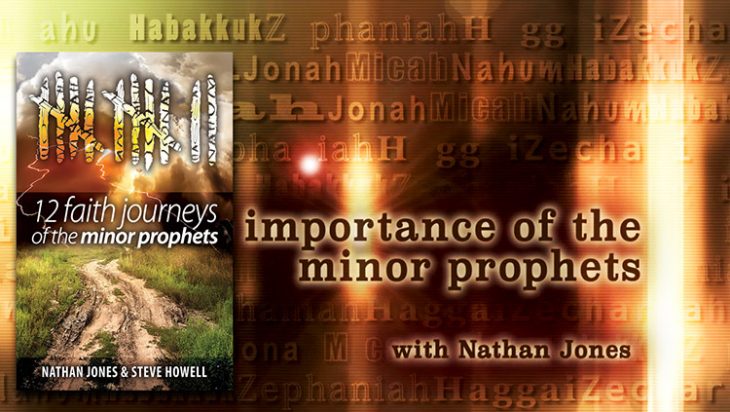What lessons about improving your own faith in God can you learn from the Minor Prophets?
Nathan Jones, my ministry colleague who serves as Associate Evangelist and Web Minister here at Lamb & Lion Ministries, has published a book titled 12 Faith Journeys of the Minor Prophets. It has already gone into additional printings and is being used by numerous Bible study groups. It is, without a doubt, the finest book I have ever read about the Minor Prophets. It is down-to earth, easy-to-understand, and it makes the messages of these prophets relevant to our lives here and now.
On a recent episode of Christ in Prophecy, I interviewed Nathan about why he felt led to write a book on such an obscure section of the Bible. I think by his answers you’ll be surprised just how relevant the Minor Prophets are to your faith today.
Their Faith Journeys
Dr. Reagan: Nathan, you titled your book, 12 Faith Journeys of the Minor Prophets. Why did you decide to focus on the Minor Prophets’ faith journeys as opposed to their prophecies?
Nathan Jones: When you read the history of Israel, say in 1&2 Kings and 1&2 Chronicles, you get the “whats,” meaning, what’s happening. This king did this, and this king did that. But, when you read the Minor Prophets, you cover the same time period, but you get the whys. Why did God do this? Why did God do that? And, the why is, it boils down to faith. The fact was that Israel was losing their faith in God and God wanted Israel to reconcile with Him. So, in the end, the theme really became about faith during a restoration time period.
Hebrews 11:1 says, “That faith is the substance of things hoped for, the evidence of things unseen.” We realized that as we went through the Minor Prophets, that in each book every one of the Minor Prophets dealt with a faith issue that Israel and Judah was lacking. Then God would perform some kind of judgment that would help bring the people back to Him. So, the whole theme of the Minor Prophets was restoration.
Dr. Reagan: Give me an example of a faith issue a Minor Prophet was dealing with.
Nathan Jones: Sure! God commanded Hosea to marry a prostitute named Gomer. She behaved much like Israel, the unfaithful “wife” of God. Hosea had to deal with marrying an unfaithful wife. She was constantly running off on him. She also had a terrible name. She eventually fell into debt and was sold into slavery, and Hosea bought her back out of slavery, even though she didn’t deserve it whatsoever. She wasn’t repentant yet, that is, until she was forgiven.
God set Hosea apart as an example of how you can have faith in God even when your heart is shattered, because God’s heart was shattered because of Israel’s waywardness. That’s the wonder of the Minor Prophets. We get a bayside window view into the heart of God that you don’t quite get in the Bible’s historical books.
Nathan Jones: That's the wonder of the #MinorProphets. We get a bayside window view into the heart of #God that you don't quite get in the Bible's historical books. Click To TweetJoel also had to deal with a crisis in faith. Once again, the people had gotten apathetic in their relationship with God, so God sent a locust plague that ate up everything. In an agrarian society, that’s an Armageddon level event. Joel had to grapple with the fact that God had sent this punishment on His own people for the purpose of restoring them to a right relationship. And, fortunately, the people did repent, at least for a little while.
Other prophets had to deal with other faith challenges. For example, Habakkuk had to deal with why he didn’t understand the messages God was having him proclaim. When he asked God to explain, God just says like, “That’s okay. You don’t have to understand. You just trust Me.”
Then there’s Jonah, probably the most famous of the Minor Prophets. With Jonah, what do you do when you have faith, but you just don’t feel like acting on your faith? He actually ran away from God’s command, and so, as most know, God caused a great fish to gobble him up and take Jonah towards Nineveh where he was supposed to go in the first place. The great news in that story is that pagan people repented, even if Jonah didn’t like that they did. And, Jonah wrote about his own folly.
Then there was Malachi, the last of the 12 Minor Prophets. Here was a situation where God graciously brought the people back out of captivity and re-established them back in the land of Judah. In only a few generations the Israelites had once again lost interest in God, and so Malachi began to speak very strongly to them about how to demonstrate the correct faith.
Haggai and Zechariah had to deal with the people when they got back from 70 years in exile, but decades later the people had once again grown spiritually apathetic. So, Malachi is standing at the Temple, for he works at the Temple, and he is watching the people bring in the lamest, saddest looking sick animals for sacrifice. Some of the people even stole their sacrifices! Malachi is like, “Hey! This isn’t how you worship God. This isn’t showing your faith in Him.” And, the people responded like, “Ah, whatever.” Their response was such a turn-off to God that He did not speak to the Israelites for 400 years after Malachi was written.
The Favorite Prophet
Dr. Reagan: Nathan, which of the Minor Prophets is your favorite?
Nathan Jones: That’s like asking me which of my children are my favorite. That’s hard!
Each of the Minor Prophets exhibited such a great faith in God. Like I said, Hosea was commanded by God to marry a prostitute as a living example that God’s heart was breaking over His wayward people. Both God and Hosea had to deal with faith when your heart is broken. Hosea, as the husband of a cheating wife, became a living example of how God was dealing with a cheating Israel.
Then there was Joel. This Minor Prophet had to deal with a devastating loss when a locust plague came down upon the farmlands. When he learned that God was behind his people’s suffering so as to wake them up from their spiritual lethargy, it became a challenge to still trust in God while He’s disciplining you for your sins.
Honestly, I don’t think there was one of the Minor Prophets that I disliked or had a problem with. But, if I had to chose a favorite, it’s be Zechariah. Zechariah is different because the people actually repented in Zechariah’s time, and they didn’t really repent, or for very long, with any of the other prophets. So, I think Zechariah was my favorite. For one, he brought hope to the people when they did repent, and two, the book it is really much like the Revelation of the Old Testament.
A Bible Study Aid
Dr. Reagan: What kind of reaction have you received so far from readers of your book?
Nathan Jones: People love it! Manhattan Bible College, where Steve was a graduate, has picked the book up as a text book for their Prophets and Poets classes. Then there are the Bible studies. Some small groups have even emailed pictures of themselves all holding the book up. I encourage people who use 12 Faith Journeys of the Minor Prophets as a Bible study aid and to please take a picture and send it to me. I love seeing people actually using this book in their Bible studies.
In the fifth segment of our look at why the Minor Prophets are relevant to us today, Nathan will explain what makes his book on the subject so unique.
Resource
Dr. David Reagan considers the book 12 Faith Journeys of the Minor Prophets by Nathan Jones and his co-author, Pastor Steve Howell, to be the best book about the Minor Prophets that he has ever read.
The book runs a total of 313 pages. It sells for $20, including the cost of shipping. You can order online through our website!






